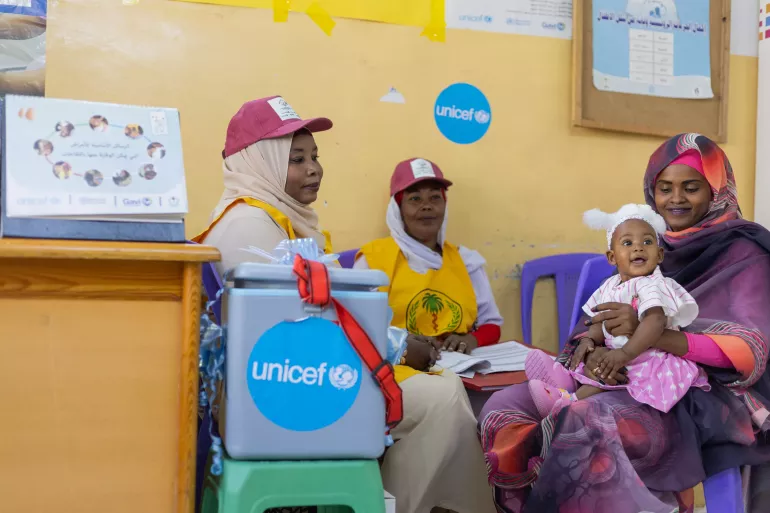Malaria vaccines roll out across Sudan

Child receives malaria vaccination as part of first campaign (Photo: UNICEF Sudan / Elfatih)
The Ministry of Health, in collaboration with the United Nations Children’s Fund (UNICEF), the World Health Organization (WHO), and the Global Vaccine Alliance (Gavi) launched the first malaria vaccination campaign in Sudan yesterday.
In a press statement, the WHO explained that the campaign follows the arrival of the first shipment of 186,000 malaria vaccine doses* to Sudan in October. 1.8 million doses of cholera vaccines also arrived in Port Sudan in September and October, on planes chartered by UNICEF.
Vaccination of 148,000 children under 12 months will begin today in 15 localities in El Gedaref and Blue Nile states. According to the Ministry of Health, the campaign aims to extend its reach to 129 localities in Sudan in 2025 and 2026.
The Sudanese Minister of Health, Haisam Ibrahim, described this as a “significant achievement.” He said this initiative “reflects the government’s strong commitment to combating malaria and protecting children’s lives.” He also said that the campaign is an important step towards securing a healthier and brighter future for the children of Sudan.
Anne Cronin, Gavi’s Sudan programme manager, lauded the achievement of vaccine introduction despite the challenges, noting that this represents a major step towards protecting children’s lives and enhances hope for a healthier future for Sudan.
Malaria is one of the world’s deadliest diseases, killing nearly half a million children under the age of five each year in Africa, according to the WHO. Sudan has the highest malaria incidence rates in the WHO Eastern Mediterranean Region. “In 2023, more than 3.4 million malaria cases were estimated in Sudan, and the disease claimed an estimated 7,900 lives, though cases and deaths are likely to be severely underreported due to the ongoing conflict and communication breakdown,” said the WHO statement.
Compounding the humanitarian crisis, Sudan is battling multiple disease outbreaks, including cholera, malaria, dengue fever, measles, and rubella. According to the United Nations Office for the Coordination of Humanitarian Affairs (OCHA), more than 17,600 cholera cases and 546 associated deaths have been reported in Sudan in the past few months, since the current outbreak began in July.
UNICEF representative in Sudan, Sheldon Yett, pointed out the importance of introducing the malaria vaccine, saying that this vaccine is an important new tool in efforts to combat child mortality.
Shible Sahbani, WHO representative in Sudan, stressed the importance of integrating the vaccine into malaria control plans, noting that the organisation continues to support a comprehensive strategy that includes the vaccine with other preventive measures.
Sudan is among the first African countries and the first in the WHO Eastern Mediterranean region to offer the malaria vaccine. The WHO described this as a significant achievement for a country facing increasing difficulties due to ongoing conflict. The vaccine is expected to reduce the number of children hospitalised and dying from the disease, according to the statement.
*Malaria vaccines have been in development since the 1960s, with substantial progress in the last decade. On October 6, 2021, the World Health Organization (WHO) recommended the widespread use of the first malaria vaccine among children living in sub-Saharan Africa and other regions with moderate to high malaria transmission. Two years later, the WHO approved a second malaria vaccine for use in malaria-endemic countries.











 and then
and then